×
The Standard e-Paper
Smart Minds Choose Us

ICT Cabinet Secretary Joe Mucheru. [Wilberforce Okwiri, Standard]
A country without a robust and free media will, over time, has its democratic credentials undermined and degraded, simply because the gatekeepers are not given the necessary space to play their critical role. That is why the media is regarded as an integral pillar of a country’s governance system.